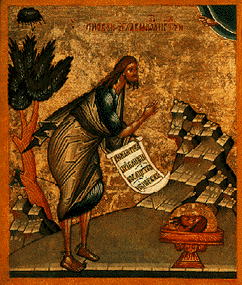St John the Baptist and
Forerunner of Christ
 Also
known as the 'Forerunner of Christ' from the Greek
'Prothromos', meaning the one 'going (running) ahead'.
John's conception, birth, life, and death, have all been
extraordinary. His recognition as a prophet is surpassed
only by his name as Christ's Baptist by which name he has
survived in the history of Christianity. His father was
Zacharias, a priest at the Temple, and his mother Elizabeth,
a relative of the Virgin Mary. They both reached old age
childless even though they constantly prayed for a son. One
day and while Zacharias was censing the altar at the Temple,
an angel of God-Gabriel, the very angel who brought to the
Virgin Mary her having been chosen to bring forth the long
expected Messiah-told Zacharias that God had favourably
received their constant prayers and his wife Elizabeth was
to give birth to a son whom they should name 'John', meaning
'the one on whom the Lord has taken mercy'. Zacharias'
doubtful questioning of the angel and his asking for a sign
were replied with a sign and a punishment by which he would
remain speechless until the birth of his son. When the
child's days came to be born and at his circumcision on the
eighth day, Zacharias wrote down the name 'John' as
instructed by the angel and his voice came back to him.
Also
known as the 'Forerunner of Christ' from the Greek
'Prothromos', meaning the one 'going (running) ahead'.
John's conception, birth, life, and death, have all been
extraordinary. His recognition as a prophet is surpassed
only by his name as Christ's Baptist by which name he has
survived in the history of Christianity. His father was
Zacharias, a priest at the Temple, and his mother Elizabeth,
a relative of the Virgin Mary. They both reached old age
childless even though they constantly prayed for a son. One
day and while Zacharias was censing the altar at the Temple,
an angel of God-Gabriel, the very angel who brought to the
Virgin Mary her having been chosen to bring forth the long
expected Messiah-told Zacharias that God had favourably
received their constant prayers and his wife Elizabeth was
to give birth to a son whom they should name 'John', meaning
'the one on whom the Lord has taken mercy'. Zacharias'
doubtful questioning of the angel and his asking for a sign
were replied with a sign and a punishment by which he would
remain speechless until the birth of his son. When the
child's days came to be born and at his circumcision on the
eighth day, Zacharias wrote down the name 'John' as
instructed by the angel and his voice came back to him.
When he reached adulthood, John withdrew to the desert in the manner of the Prophets and occupied himself with contemplation and prayer sustaining his body by eating only wild honey and locust. About the year 27 AD John appeared at the banks of the Jordan River and began his preaching of repentance. Those who heeded his preaching and repented were baptised by John in the Jordan as a sign of spiritual regeneration. He was promising his converts that his baptism in water was to be followed by the baptism of someone else who was coming after him who would baptise the believers in the Holy Spirit and in fire. Surely, the 'one after him' came to John and requested to be baptised. After hesitating John agreed to baptise the One whom he recognised as the 'Lamb of God who is going to carry the sins of the world'. At the time Christ was baptised, a miraculous voice was heard from heaven by which He was designated as the beloved Son of God and the Spirit came on Him in the form of a dove. Thus, the Father was revealed by the voice, the Son was designated in the Person of Christ, and the Holy Spirit appeared as a dove. John's call to repentance was addressed to rich and poor alike and unavoidably to the sinful palace of Herod Antippas who was denounced for his immoralities. In answer to that and at the prompting of his unlawful wife, Antippas imprisoned John. After a promise given by the king to his wife's daughter by which he would grant her anything she asked for if she danced at a banquet, John was beheaded and his head was brought to Herodias as she had asked at the request of her mother. He was believed to have been buried in Sebaste, Samaria, where his tomb was honoured in the 4th century. But after being desecrated by Julian the Apostate, about 862 AD, his relics were scattered around the Christian world.
The importance of St. John the Baptist is shown by the fact that the Orthodox Church has decreed a strict fast on the day on his death, August 29. In Byzantine iconography he is depicted as an ascetic preacher carrying a staff and a scroll with the words, 'Behold the Lamb of God'. He is also depicted wearing the wings of a messenger thus signifying his role as the one 'who came before Christ' (Prothromos). The place of his icon on the Orthodox iconostasis is adjacent to that of Christ. Feast days commemorating St John the Baptist are January 7, June 24, and August 29.
from The Orthodox Messenger, v. 8(7-8), July/Aug 1997
published bi-monthly by the SA Central Youth
PO Box 269, GLENELG SA 5045 AUSTRALIA